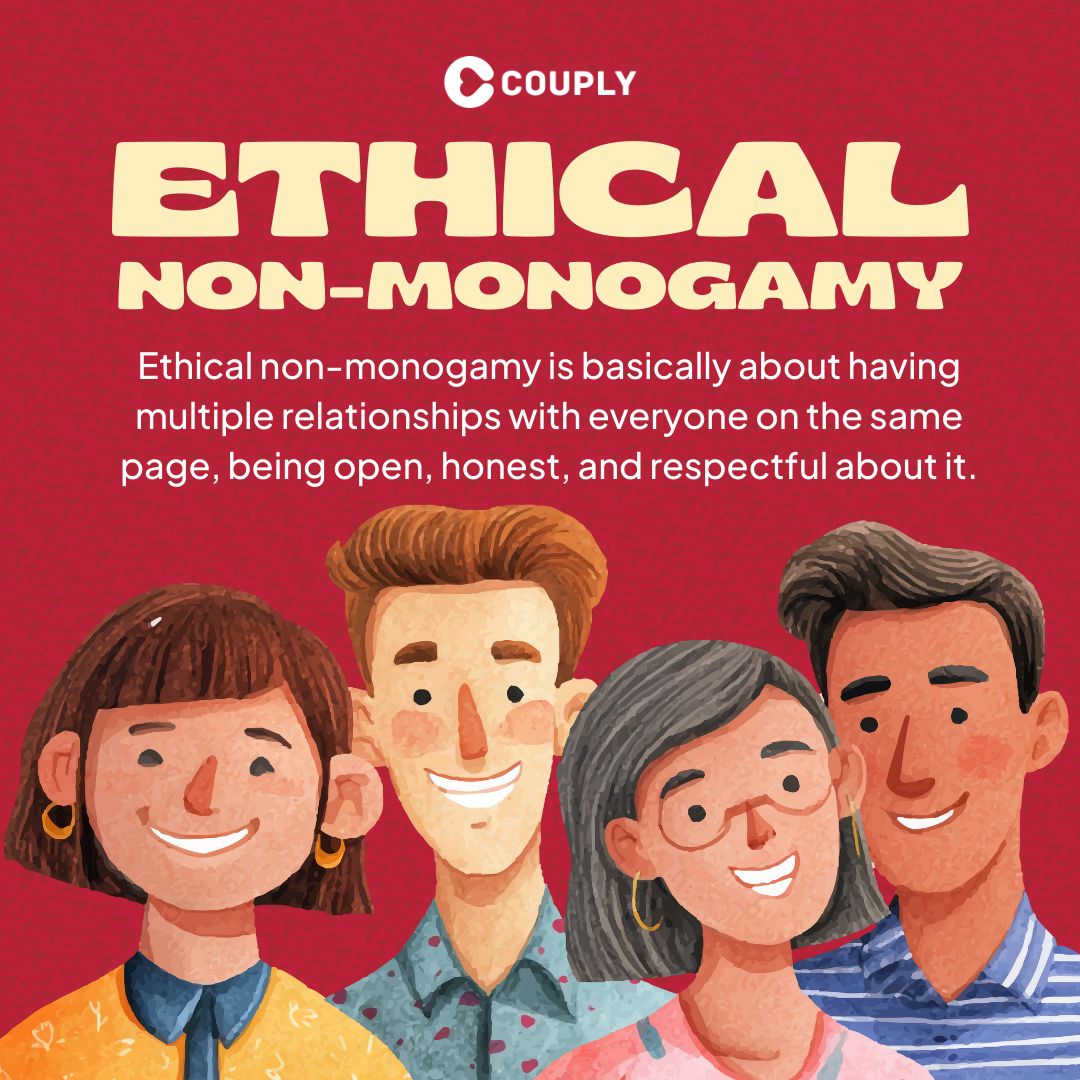You've been together for years, and the love is still there - but deep down, something feels...missing.
That spark of curiosity about what else could be out there never quite went away. Or maybe you're single and monogamy has never quite aligned with your views on love and intimacy. Whatever your situation, you're likely among the growing ranks questioning whether exclusive partnership is the only path to relationship fulfillment.
This is where ethical non-monogamy (ENM) enters the picture...
What is Ethical Non-Monogamy in relationships?

ENM refers to any intimate relationship dynamic that, through full communication and consent by all involved, allows partners to explore emotional or physical intimacy with other people. It's a direct counter to society's default assumption that monogamy is the only acceptable model. And it's an increasingly visible choice - one that could provide a more honest framework for those not wired for traditional monogamy.
ENM takes many different forms, each defined by the unique boundaries and agreements set by all partners involved. Some of the most common dynamics include:
Open Relationships: Partners have the option to become intimately involved with others outside the primary couple, with negotiated guidelines around disclosure, safe practices, etc.
Polyamory: The practice of pursuing multiple romantic relationships simultaneously, with full knowledge and consent from all partners.
Relationship Anarchy: Eliminating rigid rules or hierarchies between partners and allowing relationships to develop organically based on individual connections.
Swinging: Single or partnered people who recreationally engage in physical intimacy outside their primary relationship(s), often as couples.
Fundamentally, ethical non-monogamy requires open communication, enthusiastic consent from everyone involved, mutual trust and respect for each person's boundaries. It's the antithesis of cheating or sneaking around.
Is Ethical Non-Monogamy (ENM) the same as polyamory?

While often used interchangeably, ENM and polyamory aren't exactly synonymous. Polyamory is a specific form of ethical non-monogamy involving romantic emotional connections and commitment to multiple partners.
Ethical non-monogamy is an umbrella term that encompasses polyamory as well as other non-monogamous structures like open relationships, swinging, relationship anarchy, and so on. The key distinction is that ENM prioritizes the ethics of open consent, transparency, and mutual respect - versus monogamy or cheating. Polyamory could be considered a subset of this broader ethical approach.
So while all polyamorous relationships are part of ethical non-monogamy, not all ENM situations involve polycule-style romantic bonds with multiple people. But they do all require negotiated boundaries, continuous consent, and a commitment to honesty from everyone involved to be considered truly "ethical."
Ethical Non-Monogamy (ENM) vs polygamy

While both are non-monogamous, there are important differences between ENM and polygamy:
Polygamy traditionally involves complex marital arrangements, often rooted in religious/cultural practices. It has also been criticized for gender inequalities and coercive dynamics.
Ethical non-monogamy isn't marriage-focused and strives for full autonomy and consent by all people involved, regardless of gender. It operates independently of religious/legal contexts.
So while polygamy enables multiple spouses, ethical non-monogamy encompasses a wider range of intimate relationship structures outside the marriage construct.
Ethical Non-Monogamy (ENM) vs Swinging
Swinging is one expression of ethical non-monogamy focused on recreational partner-swapping, group sex, and non-committed sexual encounters. But ENM as a whole covers any ethical multi-partner relating, including:
- Committed romantic relationships with more than one person (e.g. polyamory)
- Open relationships pursuing emotional bonds outside a dyad
- Casual sexual connections with agreed boundaries
Swinging is usually more recreation/sex-driven rather than romance-oriented. But the core ethics of consent, transparency and mutual rules apply across ENM relating styles.
The overarching ethos is ethical multi-partner practice through open negotiation and agreement, versus cheating or secrecy. This fosters intimacy built on authenticity.
Examples of Ethical Non-Monogamy (ENM)

Ethical non-monogamy takes many different shapes and forms, customized to each person or group's needs and boundaries. Here are some common examples:
1. Open Relationships
A committed couple agrees that one or both partners can pursue sexual and/or romantic connections outside of their twosome. Clear rules are set around factors like protection, disclosure of other partners, etc.
2. Polyamory
Individuals cultivate multiple romantic relationships simultaneously, with full knowledge and consent from all partners involved. This could look like a triad (three partners), a quad (four), or even a network of interconnected relationships.
3. Relationship Anarchy
This rejects hierarchies or strict boundaries between different connections. Relationships are allowed to develop and evolve organically based on the unique intimacy and affinity between each person involved.
4. Swinging
Usually practiced by committed couples, swinging involves recreational sexual activity with other couples or singles within the lifestyle community. Emphasis is more on sexual adventure than emotional bonding.
5. Monogamish
When a couple has one or two pre-negotiated encounters with additional partners, but primarily remains monogamous to each other. May allow periodic "outsourced" experiences.
While the structures differ, the common thread is ongoing consent, open communication, and deep respect and consideration for all parties' emotional needs and boundaries.
Core Values of Ethical Non-Monogamy (ENM)

At its heart, ethical non-monogamy is built upon three core pillars:
1. Consent
Enthusiastic, continuous agreement by all parties involved about the nature of their relating and activities. Coercion or unspoken assumptions are antithetical to ENM.
2. Communication
Proactive, honest dialogue to establish and uphold boundaries, share intimate needs, and process emotions as they arise. Poor communication undermines trust.
3. Respect
Honoring each individual's rights, limits, emotions, and autonomy. Even in multi-partner bonds, each person is valued equally, not objectified.
When consent, communication, and respect are prioritized, ENM relationships can provide deeply fulfilling ways to love and connect authentically. But all three must be firmly upheld—slip in any area, and the ethics disintegrate.
Whether monogamous or non-monogamous, these values create intimacy based on empowerment and care versus possession or control. Ethical non-monogamists argue this ethos fosters personal freedom and individual growth.
Common Misconceptions About Ethical Non-Monogamy (ENM)

Myth: ENM is just an excuse for cheating or sleeping around.
Reality: The "ethical" aspect requires complete transparency, consent and agreed-upon boundaries by all parties - the opposite of cheating.
Myth: People who practice ENM can't love or commit to their partners.
Reality: ENM allows for loving commitment, just in non-possessive ways. Love and sexual exclusivity don't necessarily equate.
Myth: ENM relationships are inherently unstable or unsustainable.
Reality: With ongoing work on communication and agreements, ENM bonds can absolutely thrive long-term.
Myth: ENM is just about sex and physicality.
Reality: Many ENM relationships involve emotional intimacy with multiple people, not just sexual openness.
Myth: People who do ENM are incapable of monogamy.
Reality: Some explore ENM temporarily while others shift between monogamous and non-monogamous phases.
Myth: ENM is all or nothing - you have to be 100% polyamorous.
Reality: There's a spectrum of ENM, from open relationships to monogamish. Boundaries vary couple-to-couple.
Benefits of Ethical Non-Monogamy (ENM)

1. Freedom and Autonomy
ENM allows partners to openly explore different types of intimacy while maintaining their core relationship(s). There's freedom to get various needs met without constraints.
2. Reduced Pressure and Unrealistic Expectations
No longer relying on one person for every intimate need can be liberating. Different partners provide different fulfillment.
3. Opportunities for Growth
Exploring ENM requires continuous self-reflection, boundary setting, and communicating needs - valuable tools for any relationship.
4. Build Community
The ENM world provides built-in social circles for those whose needs don't fit monogamous models. There's automatic solidarity.
5. More Sexual Variety
For some, ENM permits guilt-free outlets to explore different sexual avenues, kinks, or orientations more freely.
Challenges of Ethical Non-Monogamy (ENM)

1. Managing Jealousy and Insecurity
Even with firm boundaries, jealousy can arise and needs ongoing processing using communication tools. Preemptive self-work is wise.
2. Constant Communication and Negotiation
Maintaining multiple ENM bonds requires continually revisiting needs, agreements, and schedules as conditions evolve.
3. Lack of Societal Norms
With ENM still stigmatized, there's less guidance from legislation or traditions on navigating logistics like hierarchies or custody.
4. Family/Social Judgement
Disapproval or lack of understanding from monogamy-centric circles can create isolation from would-be support systems.
5. Time Management Challenges
Juggling multiple intimate relationships' worth of quality time can lead to logistics overload and exhaustion if not balanced.
6. Safer Sex Practices
More partners statistically increases continual safer sex diligence and testing needed to minimize health risks.
While profoundly rewarding for some, ethical non-monogamy requires self-awareness about one's limitations. The degree of openness isn't for everyone - but mainstream modeling of ENM options are expanding.
Is ENM for You? 6 Questions to Consider

1. What are your romantic orientation and needs?
If the idea of exclusivity with one person long-term doesn't align with your desires, ENM may be a good fit. Those wired for variety or non-monogamous inclinations could find fulfillment through ENM.
2. How do you feel about jealousy and insecurity?
ENM requires consistent self-work on jealousy, insecurity and letting go of possessiveness. Reflect on your capacity for compersion (feeling joy around a partner's other relationships).
3. Are you an excellent communicator?
The bedrock of successful ENM is frequent, vulnerable communication about needs, boundaries, emotions. You must be able and willing to engage in these dialogues.
4. What are your values around honesty and transparency?
Deception violates ENM principles. You must commit to being fully honest and accountable with all parties involved.
5. How well do you handle complex logistics?
Juggling multiple intimate relationships' calendars, privacy needs, emotional check-ins, etc. requires organizational skills. Assess your capacity.
6. Are you secure in your sense of self?
Feeling "complete" without deriving all your self-worth from partnership(s) is crucial. ENM amplifies the necessity for internal validation.
Ultimately, ENM isn't for everyone. It demands tremendous self-awareness, emotional maturity and willingness to "unlearn" monogamy norms. But it can be richly rewarding for those aligned with its core principles of consent, communication and mutual respect.








